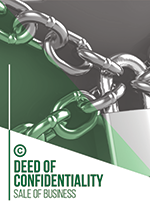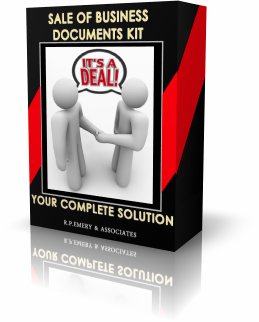Call Us -
1800 608 088


There are many reasons for selling a business – Retirement, health, family lifestyle, or you may have built a successful business and the time is right to sell and move on.
Whatever the reason, it’s going to be one of the most important business decisions you’re likely to make. The process of selling can be involved and complex if you don’t know the correct steps. However, armed with the right information you can successfully sell your own business and reap the financial rewards.
No one has the knowledge of your business that you do – its unique benefits and day-to-day operations – so who better to sell it?
What’s more, business owners place a lot of the importance on reducing and controlling information leakage, maintaining confidentiality and, of course by doing it yourself you avoid the high commission fees paid to a business broker.
Learn More: Quickie Guide to Selling your Business
Unfortunately most business owners leave it too late to think about selling their business. When you actually have to sell your business becomes the most difficult time to maximise the value of your business.
It’s very good business practice to be aware of any reasons that may cause you to sell your business and to plan an exit strategy whilst the business is in good health and /or enthusiasm is high.
Learn: When is the right time to sell your business?
Selling a business takes planning, preparation and organisation so you can get the maximum asking price. Give yourself plenty of time to put everything in order – your accounts, systems and your people. Getting and staying organised is the best way to keep track of the sales process.
Get your Documents in order
It is important to have the following documents at hand and ready for the buyer presale:
Confidentiality Agreements
It is crucial to get a Confidentiality or Non Disclosure Agreement signed before giving out any confidential information to a potential buyer. This document binds them to the terms of the agreement. Genuine buyers are fully prepared to go along with and sign the correct confidentiality agreement.
Straight talk: Make sure you have a Confidentiality Agreement and it is signed before you give any information. We cannot stress this enough.
 When selling a business, the seller often needs to disclose sensitive or confidential information to potential purchasers. This can be information of a financial nature, trade secrets, methodology, IP – data that should remain private knowledge.
When selling a business, the seller often needs to disclose sensitive or confidential information to potential purchasers. This can be information of a financial nature, trade secrets, methodology, IP – data that should remain private knowledge.
The Seller can protect this information by implementing a Deed of Confidentiality or non-disclosure agreement before divulging the information.
When selling a business, the seller often needs to disclose sensitive or confidential information to potential purchasers. This can be information of a financial nature, trade secrets, methodology, IP – data that should remain private knowledge.
The Seller can protect this information by implementing a Deed of Confidentiality or non-disclosure statement before divulging the information.
This demonstrates how seriously you take your business and protects your intellectual and financial details from being revealed.
A solid Deed of Confidentiality provides formal documentation of an individuals agreement not to disclose your valuable information. This document will provide strong legal recourse should your proprietary information be revealed to others, or used against you for competing commercial purpose.
The point of the Information Memorandum is to give a potential buyer details of your business and as such it becomes a great marketing tool.
The Information Memorandum should make the business sound appealing, and present all the significant information in a straightforward manner so a buyer can determine if they are interested in pursuing a purchase. If they are interested, they will however need further information.
The following are some of the headings from the template for writing your own Information Memorandum:
Summarized Information Memorandum
Once you have completed the Information Memorandum, you should also do a summarised version.
You determine the level of information that you will send. Be certain you have the Confidentiality Agreement signed and returned before sending out such detailed information.
Buyer Enquiry Form
Qualifying potential buyers is an important part of the sales process. We have created a Buyer Enquiry Form which provides a list of the critical questions you need to ask each and every prospect. It also has a system to measure and manage buyer enquiries, in a simple to follow format. Be wary about giving out too much company information too early in the process.
Letter of Intent
A Letter of Intent or a Term Sheet lays out the economics of the transaction before due diligence is completed. The most important terms include, the price, the deal structure, assets and inventory, non-competing covenant, who will be responsible for liabilities, information regarding due diligence.
Quick Note on Due Diligence
A buyer may want to examine a wide range of information prior to purchasing.
You will more than likely have the information already on hand, but things do change. It is wise to double-check any documents that potential buyers may request to view. It is advisable to set up a ‘business sale ready’ binder (we suggest coloured red to reinforce its importance), with sections for the different types of information required for the sale. This will save a lot of time and you will appear more professional to the buyer.
Try to limit the length of the due diligence period. This is particularly important when dealing with a larger corporation. Make sure you have told your potential buyer everything – negative and positive – before they find anything. If they find any unexpected surprises they can try to negotiate the sale price downwards or may even lose interest altogether.
If all things go well during due diligence, contracts of sale will be drawn up and the sale process completed.
 Use this Business Sale Contract template agreement when buying or selling an established business as a going concern. The supply of a business as a going concern is GST free when the seller and the buyer have a written agreement stating that the supply is a going concern.
Use this Business Sale Contract template agreement when buying or selling an established business as a going concern. The supply of a business as a going concern is GST free when the seller and the buyer have a written agreement stating that the supply is a going concern.
This comprehensive Contract for Sale of Business includes provisions that specifically deal with the goodwill of the business, stock in trade, leases, business assets, GST (goods and services tax),the business name, restraints of trade, employees, stamp duty, dispute resolution and much more.
This BUSINESS SALE CONTRACT is compliant in all states of Australia, has been drafted in Plain English and will provide strong legal protection in the event of a misunderstanding.
 Use this sale of website agreement whenever one party has agreed to sell a website/s to another legal entity.
Use this sale of website agreement whenever one party has agreed to sell a website/s to another legal entity.
Typically the sale of the website will include the transfer of the domain name or multiple domain names along with certain rights that vest with the copyright owner. These rights include exclusive rights to publish and reproduce the Website, to assign, lease or license others to use or deal with the Website, and/or to restrict any others from accessing the Website.
Navigating the complexities of selling or transferring shares in a company can be challenging. Our Share Sale Agreement Template is designed to make this process seamless and legally sound.
Whether you’re selling a company, bringing in new shareholders, raising capital, or handling a transfer of ownership due to family law separations, our template covers all scenarios with ease and efficiency.
 This pack provides you with a cost effective alternative to high priced legal fees which means more of the sales price goes in your pocket.
This pack provides you with a cost effective alternative to high priced legal fees which means more of the sales price goes in your pocket.
It is a tool that can literally save you thousand of dollars in legal costs not to mention the hours spent preparing for and meeting with your legal consultant.
You can make sure that your potential buyer knows you mean business by providing them with the appropriate professionally drafted documents when they need them. Your sale will not be delayed due to unfinished or unavailable paperwork.
This pack includes a Sale of Business Agreement, Secured Loan Agreement, Confidentiality/ non-disclosure Agreement, Assignment of Lease Agreement, Commercial Property lease Agreement, Option to Purchase Real Estate, Partnership Dissolution Agreement, Consultancy Agreement and Retail Lease Disclosure Statement.
 If you’re looking to lease your business instead of selling it, you can use this agreement to document the terms of your arrangement.
If you’re looking to lease your business instead of selling it, you can use this agreement to document the terms of your arrangement.
The Business Lease agreement can easily be modified to reflect any relevant specific conditions or agreements reached between the two parties. Standard items such as rent, lease term, business equipment, Use of the business name etc are thoroughly covered in the document.
Our Business Lease agreement will provide you with strong legal recourse should a misunderstanding arise or the other party fails to fulfil their obligations while under the agreement.
 When you’re trying to sell your business, the most valuable steps you will take is to consider who your perfect buyer might be and plan your strategy for that perfect buyer. Learn to think like your buyer so your advertisement can be in the places where they are likely to see it.
When you’re trying to sell your business, the most valuable steps you will take is to consider who your perfect buyer might be and plan your strategy for that perfect buyer. Learn to think like your buyer so your advertisement can be in the places where they are likely to see it.